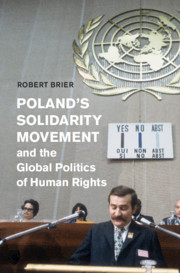
- Publisher:
- Cambridge University Press
- Online publication date:
- May 2021
- Print publication year:
- 2021
- Online ISBN:
- 9781108565233

In the historiography of human rights, the 1980s feature as little more than an afterthought to the human rights breakthrough of the previous decade. Through an examination of one of the major actors of recent human rights history – Poland's Solidarity movement – Robert Brier challenges this view. Suppressed in 1981, Poland's Solidarity movement was supported by a surprisingly diverse array of international groups: US Cold Warriors, French left-wing intellectuals, trade unionists, Amnesty International, even Chilean opponents of the Pinochet regime. By unpacking the politics and transnational discourses of these groups, Brier demonstrates how precarious the position of human rights in international politics remained well into the 1980s. More importantly, he shows that human rights were a profoundly political and highly contested language, which actors in East and West adopted to redefine their social and political identities in times of momentous cultural and intellectual change.
‘In this brilliant and carefully researched book, Brier recasts the role of human rights in the history of the late twentieth century by removing Solidarity from teleological narratives about the alleged centrality of human rights for ‘winning' the Cold War and instead offers a rich and deeply contextualized account of the movement's complex political, economic and social valences. A magnificent achievement.'
Mark Philip Bradley - University of Chicago
‘Imaginatively researched and elegantly argued, this book goes well beyond the ‘what happened' to explore how the language of human rights shaped the end of the Cold War. Brier has taken apart our assumptions about the role of human rights in the fall of communism and reassembled the pieces – the intellectual positions, the political strategies, and most important the icons – in an original and compelling way.'
Padraic Kenney - Indiana University
‘One of the most important books on human rights history to appear in the last decade, Robert Brier's masterful study of Polish dissent weaves the domestic and the international to offer a fundamentally new – and utterly fascinating – account of global human rights in the 1980s.'
Barbara Keys - Durham University
‘A breath of fresh air in a dense scholarly field long in need of an imaginative new history. Brier's broad lens, meticulous research, and lucid prose offer a rare work that will be indispensable to a range of readerships, from Polish studies to global intellectual history, that might otherwise never intersect.'
Piotr H. Kosicki - University of Maryland
‘… reading Robert Brier’s book is useful for understanding not only the past but also the present.’
Jan Olaszek Source: H-Soz-Kult
‘One would like to put the book on the table of politicians as well as humanities and social scientists as well as master's students in history …’
Natali Stegmann Source: Sehepunkte
 Loading metrics...
Loading metrics...
* Views captured on Cambridge Core between #date#. This data will be updated every 24 hours.
Usage data cannot currently be displayed.